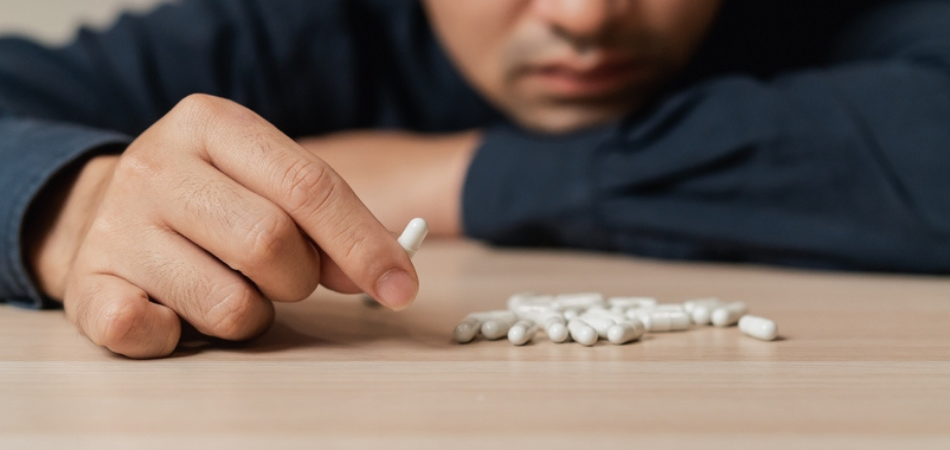ADHD and addiction are closely linked, influencing individuals in significant ways. It’s crucial to understand how these intertwined issues impact people and to explore options for seeking help if you or someone you care about is affected by both. Gaining this understanding is essential for finding appropriate support and embarking on recovery.
What is ADHD?
ADHD, or Attention-Deficit/Hyperactivity Disorder, is a neurodevelopmental condition involving ongoing issues with attention and hyperactivity-impulsivity. It affects both children and adults, often making it tough to focus, follow instructions, stay organised and control impulses. These challenges can make daily life difficult and are problematic in development.
ADHD generally presents itself in two main forms: inattentive (the AD part) or hyperactive-impulsive (the H part) but many people experience a mix of both, which is considered a third type of ADHD diagnosis.
What are the symptoms of ADHD?
As mentioned, ADHD is typically categorised into three main types based on the symptoms exhibited. These types help in understanding and diagnosing the condition better. Here are the three types:
Predominantly inattentive presentation (ADHD-I)
- Symptoms primarily involve difficulties with attention and focus.
- Individuals may need help with organising tasks, following through on instructions and staying focused on activities or conversations.
- Common symptoms include forgetfulness, distractibility and a tendency to lose things.
Predominantly hyperactive-impulsive presentation (ADHD-HI)
- Symptoms mainly include hyperactivity and impulsivity.
- Individuals may exhibit excessive fidgeting and talking and may be unable to stay seated or still for long periods.
- Impulsivity can manifest in different ways, for example, finding difficulty in waiting for turns, interrupting others and making hasty decisions without considering consequences.
Combined presentation (ADHD-C):
- This is the most common type, where individuals exhibit a combination of inattentive and hyperactive-impulsive symptoms.
- The person displays significant symptoms of both types, making it challenging to manage attention, focus and behaviour.
- Diagnosis requires meeting criteria for both inattentive and hyperactive-impulsive symptoms.
What causes ADHD?
The exact cause of ADHD remains unknown, but it could be due to a variety of factors, including potential genetic, environmental and neurobiological variables. While everyone’s experience is unique, some common causes could be attributed to:
- Genetic influences: ADHD often runs in families, so if a parent or sibling has it, there’s a higher chance others in the family might have it, too. Studies that focused on family, twin and adoption ADHD cases have shown that there was a 74% chance of heritability.
- Neurobiological aspects: Studies using brain imaging have found that people with ADHD have differences in brain structure and activity, particularly in areas that control attention, impulse control and executive functions.
- Environmental influences: Although data is scarce, some studies have suggested that prenatal exposure to antidepressant drugs such as bupropion, exposure to certain chemicals, maternal obesity, maternal folate levels and iron deficiencies could all contribute to ADHD.
Is there a link between ADHD and addiction?
Some research suggests that people with ADHD could be at a higher risk of developing substance use disorders compared to those without ADHD. Below, we explore two different reasons as to why this connection exists:
Impulsivity similarities
The trait of impulsivity is often seen in both ADHD and addictive disorders, where people tend to act impulsively and make impulsive choices.
Some researchers believe that genetic factors play a role in controlling impulsivity and that preferring immediate rewards over delayed ones might make people more vulnerable to certain disorders where impulsivity is a key factor (like ADHD).
Another perspective is that ADHD is part of a broader condition called reward-deficiency syndrome, which is linked to a higher risk of addictive behaviours.
Self-medication and comorbidities
People with ADHD may use substances to cope with their symptoms, such as using stimulants to improve focus or using depressants to calm hyperactivity and anxiety. The continuous use of these substances could form addictions to them.
Additionally, a study found that around 51.8% of individuals with ADHD also had one or more additional mental health conditions, with anxiety (37.0%) and depression (29.9%) being the most common. Because of these statistics, people with ADHD and a co-occurring mental health issue may be more likely to self-medicate to alleviate the negative symptoms associated with these conditions.
Does ADHD medication cause people to form addictions?
ADHD medications, particularly stimulants like Adderall, can be addictive if misused. It’s natural to think that using these medications could lead to addiction. However, research indicates that this risk is relatively low when the medications are taken as prescribed.
In fact, studies show that long-term use of ADHD medications may actually reduce the likelihood of developing a substance use disorder (in those with ADHD). It’s suggested that proper, sustained treatment with ADHD medication lowers the chances of addiction, challenging the common assumption that these medications increase addiction risk.
However, the potential for addiction does exist even for those with ADHD if the medication is abused. When individuals with ADHD take higher doses than prescribed or use the medication in ways not intended by their healthcare provider, they increase their risk of developing a dependency.
Therefore, while prescribed use of ADHD medication is generally safe and beneficial, individuals with ADHD and their caregivers need to adhere strictly to the prescribed dosage and monitor for any signs of misuse to prevent the possibility of addiction.
What is a dual diagnosis?
A dual diagnosis is when someone has both a mental health disorder and a substance use disorder at the same time. This means they are dealing with both issues simultaneously, which makes treatment more challenging but also even more important. To recover successfully, it’s essential to address both conditions together.
Having both ADHD and addiction can create a vicious cycle where each problem makes the other worse. For example, someone with ADHD might use substances to cope with their symptoms, which can lead to addiction. On the flip side, substance abuse can make ADHD symptoms more severe, making it harder to manage the mental health condition.
How is ADHD and addiction treated at a rehab centre?
When ADHD coexists with addiction, treatment becomes more complex because traditional approaches may not fully address the unique challenges posed by ADHD. For instance, the difficulty in maintaining focus and impulsiveness associated with ADHD can hinder the effectiveness of certain therapies that tackle addiction.
That’s why a specialised strategy that considers both ADHD and addiction is essential for successful treatment and long-term recovery. Comprehensive addiction treatment programmes that also address co-occurring ADHD can help you manage both conditions more effectively, leading to better outcomes in recovery.
If necessary, depending on the substance involved, detoxification might be required, which is followed by therapeutic interventions. These interventions are beneficial for co-occurring addiction and ADHD are as follows:
- CBT: Cognitive Behavioural Therapy (CBT) helps people with both ADHD and addiction by identifying and changing negative thought patterns and behaviours, which enhances coping skills.
- DBT: Dialectical Behaviour Therapy (DBT) supports those with ADHD and addiction by teaching mindfulness, emotional regulation and distress tolerance, helping to manage impulsive behaviours.
- One-on-one counselling: One-on-one counselling offers personalised support and strategies to address the unique challenges of ADHD and addiction, fostering personal growth and recovery.
- Yoga therapy: Yoga therapy promotes physical and mental relaxation, improving focus and reducing stress, which is particularly beneficial for those dealing with ADHD and addiction.
- Art therapy: Art therapy provides a creative outlet for expressing emotions and thoughts, helping individuals with ADHD and addiction process their experiences and develop healthier coping mechanisms.
What are the next steps?
If you or someone you know is struggling with ADHD and addiction, it’s crucial to seek help from a rehab programme. ADHD symptoms could lead to self-medication, resulting in ADHD and alcohol addiction or drug addiction and ADHD. Addressing both ADHD and addiction simultaneously is essential for effective treatment.
Don’t wait any longer—reach out to us today and find a rehab facility that understands the unique challenges of managing ADHD and addiction today.
Call our admissions line 24 hours a day to get help.
(Click here to see works cited)
- Faraone SV, Larsson H. Genetics of attention deficit hyperactivity disorder. Mol Psychiatry. 2019 Apr;24(4):562-575. doi: 10.1038/s41380-018-0070-0. Epub 2018 Jun 11. PMID: 29892054; PMCID: PMC6477889.
- Pereira-Sanchez V, Castellanos FX. Neuroimaging in attention-deficit/hyperactivity disorder. Curr Opin Psychiatry. 2021 Mar 1;34(2):105-111. doi: 10.1097/YCO.0000000000000669. PMID: 33278156; PMCID: PMC7879851.
- Froehlich TE, Anixt JS, Loe IM, Chirdkiatgumchai V, Kuan L, Gilman RC. Update on environmental risk factors for attention-deficit/hyperactivity disorder. Curr Psychiatry Rep. 2011 Oct;13(5):333-44. doi: 10.1007/s11920-011-0221-3. PMID: 21779823; PMCID: PMC3277258.
- Lazaratou H, Palaiologou A, Anagnostopoulos D. [Impulsivity as an immediate factor between addictive disorders and Attention Deficit-Hyperactivity Disorder]. Psychiatriki. 2017 Apr-Jun;28(2):156-164. Greek, Modern. doi: 10.22365/jpsych.2017.282.156. PMID: 28686562
- Merrill RM, Merrill AW, Madsen M. Attention-Deficit Hyperactivity Disorder and Comorbid Mental Health Conditions Associated with Increased Risk of Injury. Psychiatry J. 2022 Oct 14;2022:2470973. doi: 10.1155/2022/2470973. PMID: 36277995; PMCID: PMC9586798.
- Chang Z, Lichtenstein P, Halldner L, D’Onofrio B, Serlachius E, Fazel S, Långström N, Larsson H. Stimulant ADHD medication and risk for substance abuse. J Child Psychol Psychiatry. 2014 Aug;55(8):878-85. doi: 10.1111/jcpp.12164. Epub 2013 Oct 25. PMID: 25158998; PMCID: PMC4147667.









